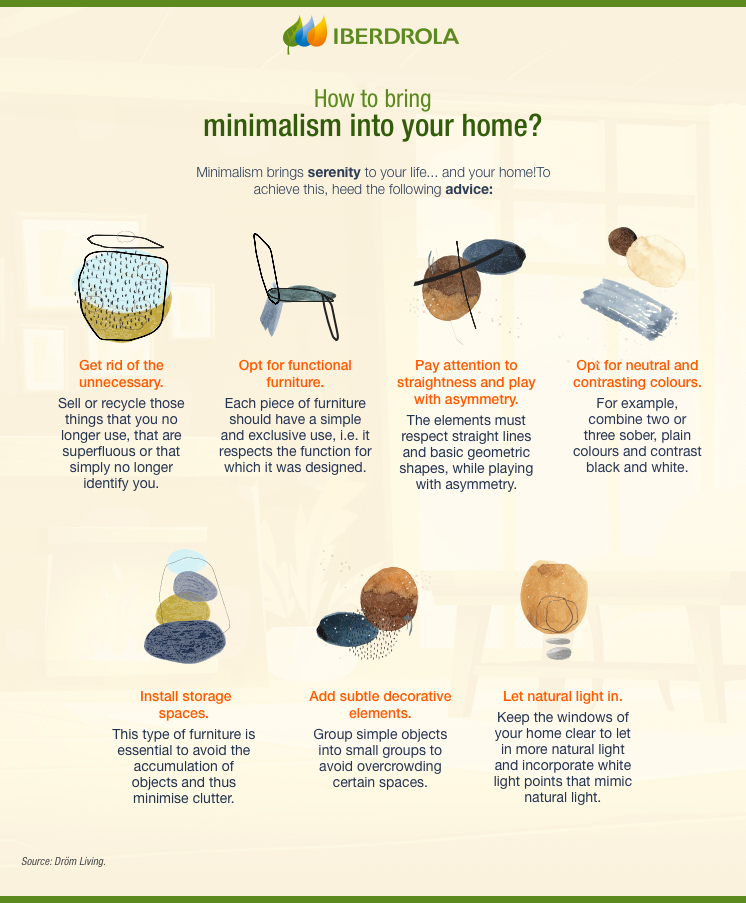Minimalist lifestyle
A minimalist lifestyle, when less is more for both you and the environment
Minimalism, originally an architectural trend that seeks to reduce works to the essentials, has been transferred to other areas. The idea is very simple: less is more, which applied, for example, to our daily lives means reducing the use and consumption of material goods as much as possible. This way of being in the world has positive effects on the environment and recent environmental initiatives, such as the Zero Waste movement, are very close to it.

In the last decade, minimalism has transcended the world of architecture to establish itself as an alternative to the excessive consumerism of today's society. The key? "Less is more". Although the popular phrase was first coined in the 1960s by the American artist Ad Reinhardt, it was the German architect Mies Van der Rohe who popularised it, creating an artistic movement that has survived to the present day as a lifestyle that proposes a different vision of the world.
What is minimalism
In addition to an architectural trend that seeks to reduce structures to their essentials, that is, to strip them of everything superfluous, minimalism is today a philosophy of life that proposes a simpler way of being and acting and, above all, one that is kinder to the environment and to society as a whole.
In fact, a minimalist lifestyle prioritises the simple over the complex and quality over quantity as opposed to the culture of extreme consumerism. American designer, writer and lecturer Graham Hill reflects on this in one of his TED Talks External link, opens in new window.: "We have become so consumerist that we need more and more space, which also causes us to incur huge debts and generate huge environmental footprints. Yet our levels of happiness remain the same as they were 50 years ago".
External link, opens in new window.: "We have become so consumerist that we need more and more space, which also causes us to incur huge debts and generate huge environmental footprints. Yet our levels of happiness remain the same as they were 50 years ago".
As an advocate of minimalism, Hill suggests eliminating all the accessories from our lives — all those things we never use — and to think before we buy. In order to achieve this lifestyle that is good for us and good for the environment in the midst of the fight against climate change, he proposes a three-step formula that he calls "life edited": 1. eliminate ruthlessly, 2. think small, small is sexy, and 3. whatever you have, make it functional.
Minimalism in everyday life
Hill summarises some of the keys to start living a minimalist life:
 Buy quality, not quantity
Buy quality, not quantity
Minimalism is not about not shopping, but about shopping more intentionally and less impulsively. The key is to invest in quality so that products last. The price will be a little higher, but in the long run you save by cutting down on frequent purchases, as well as reducing waste.
 Digitise as much as you can
Digitise as much as you can
If you are a great lover of film, music or literature, consider digitising your collection. As well as saving space in your home, you will be sure to always find what you are looking for. If you like to physically experience things, libraries, cinemas or concert halls are a great alternative.
 Eliminate without fear
Eliminate without fear
Sometimes it is difficult to get rid of material possessions, but it is an essential step. That said, only do without the things you do not need. To begin with, identify which things have a purpose and which do not. If they do not add value, recycle them or sell them to give them a second life.
 Research how to reuse
Research how to reuse
Consider which items can be exchanged for items that are not single-use, for example, a glass bottle for a plastic one or a ceramic mug instead of a plastic cup. In fact, the days of single-use plastics are numbered, so the sooner you get used to this the better.
 Give everything a place
Give everything a place
It is time to be creative with storage and organise everything, making sure you only keep the essentials and keep them in the right place. If you find you lack space for certain things or that you haven't used them for a while, perhaps the time has come to reconsider whether you really need them.

SEE INFOGRAPHIC: How to bring minimalism into your home? [PDF] External link, opens in new window.
What are minimalists like
Like Hill, more and more people believe that the minimalist lifestyle is good for people and the environment. As a result, they embrace it and promote it. The Minimalists External link, opens in new window. platform is a good example. Created in 2010 by Americans Joshua Fields Millburn and Ryan Nicodemus, known worldwide for their Netflix documentaries (Minimalism, 2016 and Less Is Now, 2021), it now has five million followers, according to The Washington Post.
External link, opens in new window. platform is a good example. Created in 2010 by Americans Joshua Fields Millburn and Ryan Nicodemus, known worldwide for their Netflix documentaries (Minimalism, 2016 and Less Is Now, 2021), it now has five million followers, according to The Washington Post.
What are minimalists like? They are ordinary citizens who are against uncontrolled consumerism and in favour of more sustainable development. In fact, recent environmental initiatives, such as the Zero Waste movement, are closely linked to this way of life. Its practitioners develop the ability to identify what is essential, what has purpose in their lives, and to eliminate everything else in order to gain freedom, tranquillity and space.
In fact, for the followers of minimalism, some twenty million according to the American magazine GQ, belongings are not just products, but obligations that generate stress and debt, as Hill pointed out. In this sense, the American speaker asks with humour: "when are we happier than when we go on holiday with everything we need in a suitcase?".
The benefits of minimalism
Whatever the reason for adopting a minimalist lifestyle, it has undeniable positive effects on both people and the environment. Among the first, Forbes magazine lists the following:
- It improves personal finances: owning less stuff means spending less and saving more.
- It increases quality of life: it brings more freedom, more order and more time for oneself.
- It reduces stress and anxiety: having fewer possessions reduces the number of worries.
- It allows us to know ourselves better: the fewer the distractions, the easier it is to discover what we are passionate about.
Minimalism implies a number of unwritten obligations that have a positive impact on the environment:
- It helps to reduce the most polluting industrial activities, such as textile manufacturing, and the overexploitation of natural resources.
- It means less waste generation and the ability to manage waste in a more sustainable way.
- It reduces the use and presence of plastics, which are particularly harmful to seas and oceans, by replacing them with biodegradable materials.
- It reduces environmental pollution by using less individual means of transport, as well as reducing our ecological footprint.




